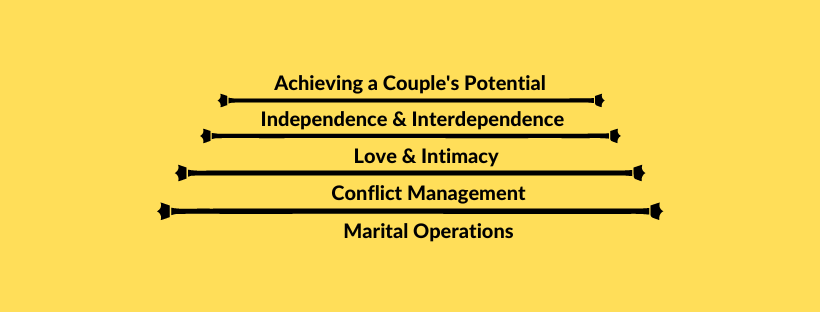When I was younger, my world view of marriage was shaped by watching my parents. Most of their arguments had very little to do with each other, and much to do with everyone else in the world.
So I grew up thinking that if it were just my partner and I living together, all would be well. We’d magically fit together like pieces of a puzzles.
We obviously didn’t.
Years in, we are still learning to fit, every single day, as do most couples. But are we getting any better at it? I wonder. How do you measure the quality of a marital relationship, and its evolution over a period of time?
No, I am not talking about birthing two children, buying prime real-estate or amassing wealth for the next 3 generations. Given that more and more people from this generation are opting out of parenthood, home ownership, employment even, what are the markers of a successful relationship?
I am going to borrow from the Maslow’s hierarchy of needs for individuals to build a similar stack of needs for couples.
Hierarchy of Marital Needs
Marital Operations (crediting this phrase to Pratik, one of my readers who is incidentally building something exciting in this space) - once you start living together, the fundamental need of a couple is to get the home in order - meals, chores, work, social calendars, children and all the little everyday things that require an inordinate amount of coordination. Couples need a system to align on the logistics of life effectively so life becomes easier individually as well as collectively. Most marriages that collapse do so because the couple has failed to build a functional collaboration.
Conflict Management - An ability to keep the conversation going. Now, you may have heard people say that the end of conversation is the beginning of the end of a relationship. It’s imperative that a couple learns to communicate with each other despite their individual conflict management styles (this deserves a separate post). This is build on trust, a sense of security and a faith that losing an argument doesn’t mean the end of a relationship, and that you have the opportunity to try again.
Love and Intimacy - we vehemently believe that love is the bedrock of modern marriages, but it’s kind of not (there, I said it). Love and sexual compatibility are farmed. They might blossom in the wild, but you’ve got to tend to it if you want to keep ‘em alive.
Belonging to a couple, being a part of a unit greater than yourself is powerful. What a wonderful feeling it is when someone you love thinks of you fondly, and is willing to sometimes put aside their interests, even temporarily, because they want to play this infinite game with you. We have evolved to crave this in a marriage.
But, love doesn’t pay bills. But once the bills are paid for, the first thing people question about their relationships is love and intimacy.
As for intimacy, it’s not about sex. Sex is part of marital operations, but great sex? That’s part of intimacy. You can only enjoy great sex once you’ve taken care of marital operations, feel safe to communicate honestly and learn to satisfy each other physically and emotionally.
Independence and Inter-dependence - this is what we see a lot of nowadays, couples seeking respect for their time, space and independence, in a marriage. As much as people want to be in a couple, they don’t want to trade their freedom, at least not entirely. So finding that balance of how and when you can depend on each other, yet allow each other to explore independent interests in a marriage is a new-found widespread need. This is unchartered territories, so not for the faint hearted.
Achieving a Couple’s Potential - I remember when I worked at Toyota, they had this principle which continues to stay with me - team work is about 1000 people taking one step together and not about one person taking a 1000 steps on their own. So a marriage is successful when each of the individuals in a couple are successful, despite each other and with each other, that’s achieving their potential as a couple.
Now, I leave you with one last thought before I go - why is it that we rigorously train and test our professional capabilities for years (14-20 years) before they actually “pay off”, but we don’t have the patience to await the pay off of our efforts in a marriage?
What I am reading/ watching/ listening to:
House of Cards: I have a sudden interest in politics and history. I’ve been consuming lots of content in this space, not just fiction, but non-fiction too. In fact, I even completed a course on Global Diplomacy on Coursera last month. I guess anything to do with drawing behavioural patterns in individuals or institutions, I find fascinating.
Rest is History: The husband introduced me to this. I cannot tell you how much I’ve am in love with the relationship between Tom Holland and Dominic Sandbrook on the podcast. I wish I had a partner in crime like that to ramble off on relationships.
Dominion by Tom Holland: Through the pod, I discovered Dominion, which I’ve just started reading. I don’t know much about Christianity and how it’s shaped the Western mind, so this will be an enlightening read.



